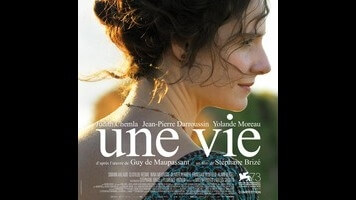First seen happily farming alongside her father (Jean-Pierre Darroussin), who’s a baron, young Jeanne (Judith Chemla) wants nothing more than ordinary quasi-aristocratic contentment. She falls in love with a relatively impoverished but dashing man, Julien (Swann Arlaud), marries him, and gives birth to their son. Alas, Julien turns out to be a scoundrel, cheating on her first with their servant, Rosalie (Nina Meurisse), and later, after he’s repented and been forgiven, with Jeanne’s best friend, Madame De Fourville (Clotilde Hesme). These sordid affairs take a hideous turn that “solves” the problem permanently, but that by no means marks the end of Jeanne’s trials. Instead, her son, Paul (played by three different actors as he ages), becomes the bane of her existence, ignoring her for years except to repeatedly badger her for money. (The film’s second half strongly recalls Mildred Pierce, minus Veda’s Machiavellian genius.) And that’s it, pretty much—people mistreat Jeanne, and she stoically endures, staring off into the distance and triggering warmly lit flashbacks to more cheerful times (which the film otherwise skips right past).
Perversely, the most compelling aspect of A Woman’s Life is the combustible material it chooses to omit. Director Stéphane Brizé (The Measure Of A Man, Mademoiselle Chambon), who also co-wrote the screenplay with Florence Vignon, frequently leaps forward in time without any signposts, and depicts only the aftermath of major events; it’s a deliberately jarring strategy, and often very effective. Unfortunately, that’s a bit like admiring frames instead of the paintings that those frames were designed to showcase. Chemla has a sharp, striking profile, but her performance as Jeanne is unproductively opaque—Brizé’s pictures of her need to be worth a thousand of De Maupassant’s elegant words, and the ratio is more like a dozen words per. (Darroussin and Yolande Moreau—superb actors both—are squandered in the roles of Jeanne’s parents.) It doesn’t help that Jeanne scarcely ages over the course of more than 30 years (from roughly 1815 to 1850), looking, at the conclusion, like a 30-ish woman with prematurely gray hair.
Mostly, though, A Woman’s Life frustrates because it’s neither entertaining nor illuminating to watch a character passively absorb constant misery. Overcoming slings and arrows, sure. Succumbing to a tragedy at least partially of one’s own making, fine. Plenty of masterpieces in both categories. Here, even when Jeanne makes an effort to avoid trouble—refusing her priest’s entreaties to tell her best friend’s husband about the affair, for example, as she understands that no good can possibly come from his learning the truth—some other individual proceeds to make her life hell. A great writer like De Maupassant can create dramatic texture from such circumstances by delving deep into the protagonist’s head. Brizé is certainly a talented filmmaker, but this is his first period costume drama (and his first movie in a decade that doesn’t star or co-star the great Vincent Lindon), and the emotional complexity that usually characterizes his work gets suffocated by fidelity to a straightforward tale of woe. It’s a blessed relief when one’s worst assumptions about how the movie might end aren’t confirmed, but that’s a barren variety of catharsis.































![Rob Reiner's son booked for murder amid homicide investigation [Updated]](https://img.pastemagazine.com/wp-content/avuploads/2025/12/15131025/MixCollage-15-Dec-2025-01-10-PM-9121.jpg)









